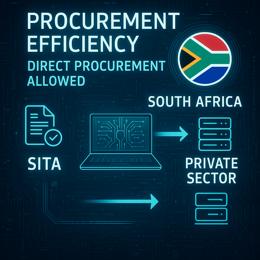Image created by AI
Controversy Swirls Around SAA Privatisation as Minister Enforces Secrecy
In a move that has stirred controversy and debate, Pravin Gordhan, South Africa's Minister of Public Enterprises, and a member of the South African Communist Party, has garnered attention for what some might describe as a paradoxical push to privatize South African Airways (SAA). The minister, who played a prominent role in the ANC and the struggle against apartheid, now seems to be navigating the waters of state-owned enterprise divestiture with a strategy that has raised eyebrows and questions.
The privatization of SAA, characterized by Gordhan's request for a nondisclosure agreement from overseeing committee members, has become a focal point of discussion not only for its implications for the airline but also for the implications for government transparency and the handling of public assets. According to reports, Gordhan reluctantly provided documents about the sale to the oversight committee, casting a specter of secrecy over the entire process.
This nondisclosure push represents an ironic twist for the ANC-led government, once critics of the National Party's penchant for secrecies. The concern extends well beyond the party lines, touching the very core of democratic principles and the rights of citizens who are, effectively, the actual shareholders of the state-owned airline. These citizens are now facing a barrier to scrutinize the privatization terms, especially concerning the financial viability of the arrangement.
The sale, involving the Takatso Consortium as the preferred bidder for SAA, raises serious questions. The potential erasure of SAA’s significant debts, which might be covered by government financial guarantees, represents a hidden burden that South African taxpayers could be shouldering without full awareness or consent. Moreover, the nominal R51 tag associated with the purchase only deepens the mystery surrounding the deal's specifics.
Despite an evident argument for the need to keep commercially sensitive details confidential, there remain concerns that the scales may be tipping away from the need for accountability and transparency regarding the management of a public asset. The potential fiscal repercussions are immense, including the loss figures reaching nearly R800 million for nine months of trading, highlighting the urgency for SAA's financial stability to be publicly addressed.
The balancing act between commercial confidentiality and the public interest is delicate, and the SAA sale's handling sets a powerful precedent for future transactions involving state assets. The public’s right to information, the commitment to transparency, and the legitimacy of decision-making processes within South Africa’s democracy are at stake as this debate continues to unfold.
As calls for clarity grow louder, the South African public waits to see if the government will oblige with a more open approach or if the privatization of SAA will proceed under a cloud of mystery, leaving citizens questioning the decisions made on their behalf.










